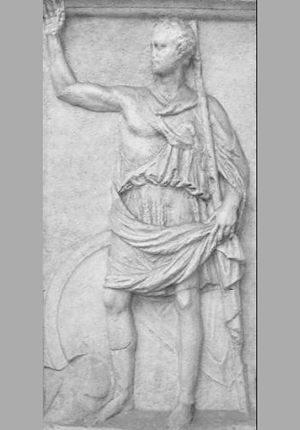Historic Document
The Histories (ca. 167-146 BC)
Polybius | 167-146 BC

Public domain
Summary
Polybius son of Lycortas (ca. 200-ca. 118 BC) was author of The Histories, which dealt with Rome’s conquest of the Mediterranean world in the period stretching from 264 to 146 BC. Polybius was born into a prominent political family that resided in Megalopolis in the Peloponnesus. In 167 BC, he was dispatched as a hostage to Rome. There, he was assigned to the household of Aemilius Paullus and acquired as a close friend the man who would be known as Scipio Aemilianus. In the process, he became acquainted with that city’s leading men, and he was ideally situated to explain to his fellow Hellenes what had happened to them in the period described in the volumes of his great tome. The passages that most interested the Founding generation were those in the sixth book that described the Roman regime as a form of government and a way of life and that marked out its superiority to the oligarchies and democracies of Hellas.
Selected by

Paul Rahe
Professor of History and Charles O. Lee and Louise K. Lee Chair in the Western Heritage at Hillsdale College

Jeffrey Rosen
President and CEO, National Constitution Center

Colleen A. Sheehan
Professor of Politics at the Arizona State University School of Civic and Economic Thought and Leadership
Document Excerpt
The Histories, Book 6
Having stated how political power is distributed among the different parts of the state, I will now explain how each of the three parts is enabled, if they wish, to counteract or co-operate with the others. The consul, when he leaves with his army invested with the powers I mentioned, appears indeed to have absolute authority in all matters necessary for carrying out his purpose; but in fact he requires the support of the people and the senate, and is not able to bring his operations to a conclusion without them. For it is obvious that the legions require constant supplies, and without the consent of the senate, neither corn, clothing, nor pay can be provided; so that the commander’s plans come to nothing, if the senate chooses to be deliberately negligent and obstructive. It also depends on the senate whether or not a general can carry out completely his conceptions and designs, since it has the right of either superseding him when his year’s term of office has expired or of retaining him in command. . . . As for the people it is most indispensable for the consuls to conciliate them, however far away from home they may be; for, as I said, it is the people which ratifies or annuls terms of peace and treaties, and what is most important, on laying down office the consuls are obliged to account for their actions to the people. So that in no respect is it safe for the consuls to neglect keeping in favour with both the senate and the people.
The senate again, which possesses such great power, is obliged in the first place to pay attention to the commons in public affairs and respect the wishes of the people, and it cannot carry out inquiries into the most grave and important offences against the state, punishable with death, and their correction, unless the senatus consultum is confirmed by the people. The same is the case in matters which directly affect the senate itself. For if anyone introduces a law meant to deprive the senate of some of its traditional authority, or to abolish the precedence and other distinctions of the senators or even to curtail them of their private fortunes, it is the people alone which has the power of passing or rejecting any such measure. And what is most important is that if a single one of the tribunes interposes, the senate is unable to decide finally about any matter, and cannot even meet and hold sittings; and here it is to be observed that the tribunes are always obliged to act as the people decree and to pay every attention to their wishes. Therefore for all these reasons the senate is afraid of the masses and must pay due attention to the popular will.
Similarly, again, the people must be submissive to the senate and respect its members both in public and in private. Through the whole of Italy a vast number of contracts, which it would not be easy to enumerate, are given out by the censors for the construction and repair of public buildings, and besides this there are many things which are farmed, such as navigable rivers, harbours, gardens, mines, lands, in fact everything that forms part of the Roman dominion. Now all these matters are undertaken by the people, and one may almost say that everyone is interested in these contracts and the work they involved. For certain people are the actual purchasers from the censors of the contracts, others are the partners of these first, others stand surety for them, others pledge their own fortunes to the state for this purpose. Now in all these matters the senate is supreme. It can grant extension of time; it can relieve the contractor if any accident occurs; and if the work proves to be absolutely impossible to carry out it can liberate him from his contract. There are in fact many ways in which the senate can either benefit or indicate those who manage public property, as all these matters are referred to it. What is even most important is that the judges in most civil trials, whether public or private, are appointed from its members, where the action involves large interests. So that all citizens being at the mercy of the senate, and looking forward with alarm to the uncertainty of litigation, are very shy of obstructing or resisting its decisions. Similarly everyone is reluctant to oppose the projects of the consuls as all are generally and individually under their authority when in the field.
Such being the power that each part has of hampering the others or co-operating with them, their union is adequate to all emergencies, so that it is impossible to find a better political system than this. For whenever the menace of some common danger from abroad compels them to act in concord and support each other, so great does the strength of the state become, that nothing which is requisite can be neglected, as all are zealously competing in devising means of meeting the need of the hour, nor can any decision arrived at fail to be executed promptly, as all are co-operating both in public and in private to the accomplishment of the task which they have set themselves; and consequently this peculiar form of constitution possesses an irresistible power of attaining every object upon which it is resolved. When again they are freed from external menace, and reap the harvest of good fortune and affluence which is the result of their success, and in the enjoyment of this prosperity are corrupted by flattery and idleness and wax insolent and overbearing, as indeed happens often enough, it is then especially that we see the state providing itself a remedy for the evil from which it suffers. For when one part having grown out of proportion to the others aims at supremacy and tends to become too predominant, it is evident that, as for the reasons above given none of the three is absolute, but the purpose of the one can be counterworked and thwarted by the others, none of them will excessively outgrow the others or treat them with contempt. All in fact remains in statu quo, on the one hand, because any aggressive impulse is sure to be checked and from the outset each estate stands in dread of being interfered with by the others. . . .




